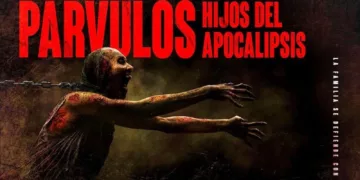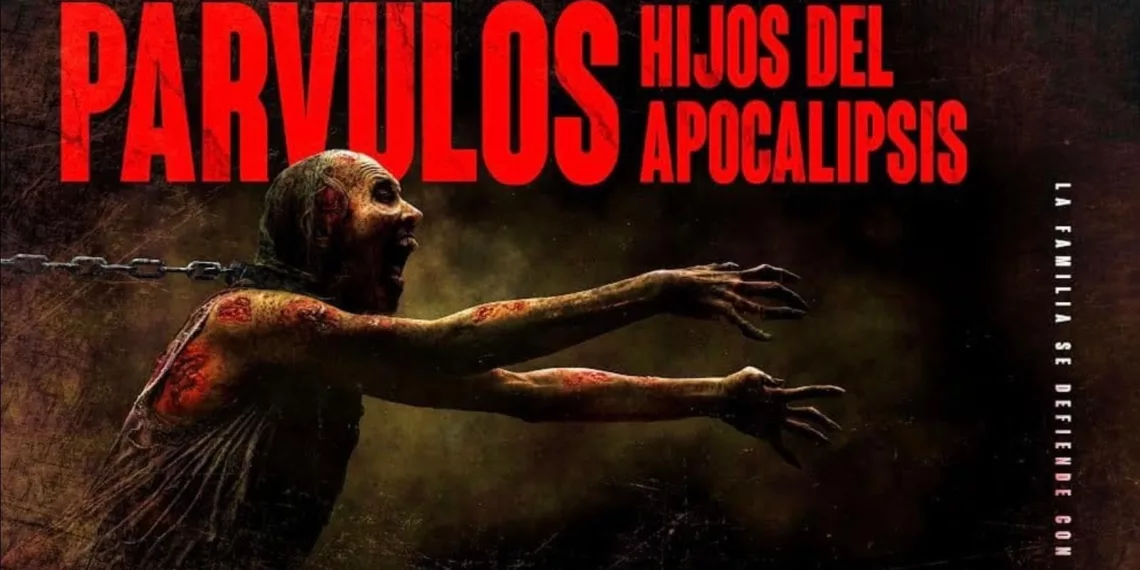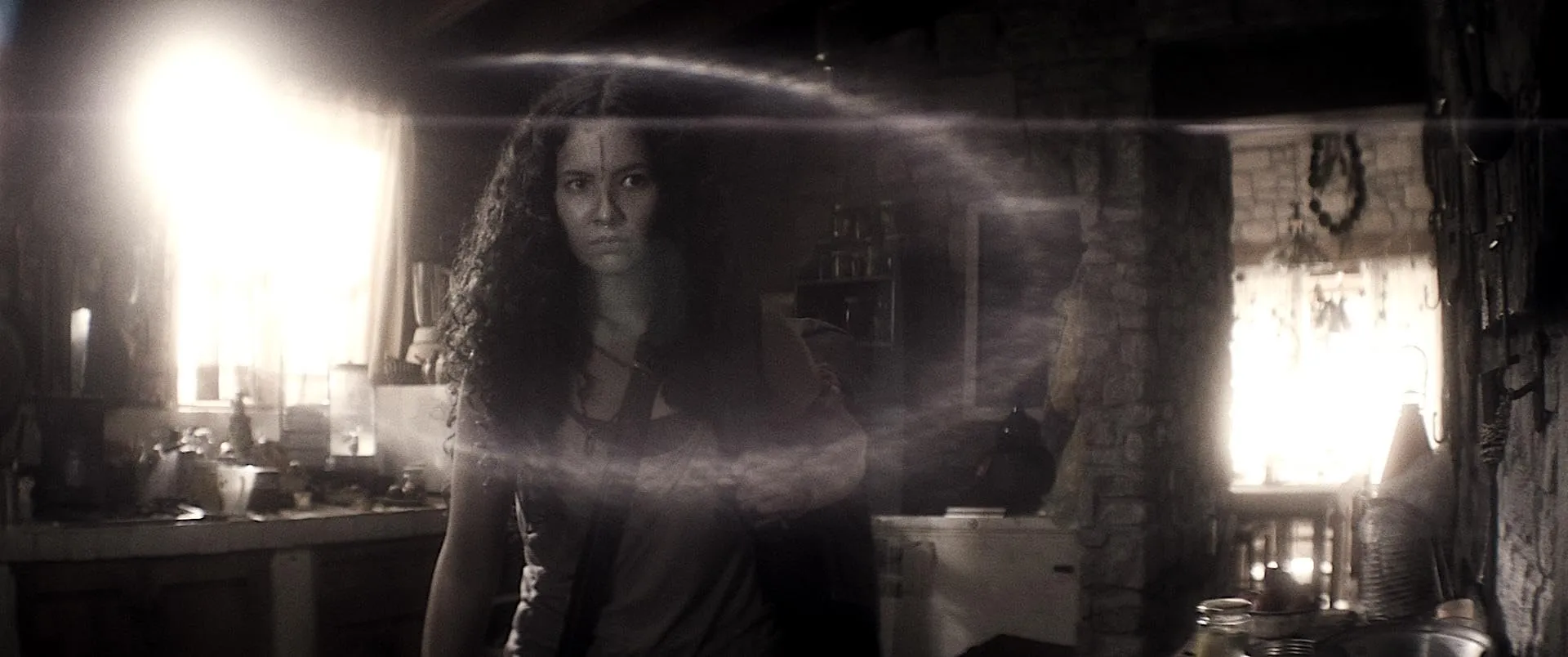Mexican director Isaac Ezban has quickly become a favorite of genre fans for his inventive blending of science fiction, horror, and psychological thrills. In films like The Incident and The Evil Eye, he’s warped time and viewers’ perceptions through surreal storytelling. Parvulos marks something of a shift, focusing the lens on more emotionally grounded material.
We meet three brothers—Salvador, Oliver, and Benjamin—struggling to survive in a ravaged world overrun by zombies. A viral outbreak has left the kids orphaned, forcing Salvador into a parental role at a young age. He hunts, provides for his siblings, and keeps the truth about their “parents” hidden away. Beneath its surface of entrails-ripping action, Parvulos contemplates what really powers people through impossible situations—the enduring bonds of family.
Through these young protagonists, Ezban examines familiar post-apocalyptic and coming-of-age genres. But he brings new life to tropes by prioritizing full-bodied characters we really care about. Their difficult journey says as much about the resilience of the human spirit as it does explosive undead takedowns. Fans of The Walking Dead searching for something deeper may find it within Parvulo’s deeply felt family drama.
Survival of the Fittest
We’re introduced to three brothers doing what they can to get by: Salvador, Oliver, and Benjamin. Salvador has stepped into the father role at a young age, taking charge of hunting and providing meals. Though missing part of his leg, he’s adapted well and keeps his younger siblings in line.
Benjamin, the youngest, can’t resist satisfying his curiosity. Exploring the house, he discovers a nasty surprise locked in the basement. It turns out mom and dad aren’t out scavenging like Salvador claimed. They’re down there, but far from themselves—the outbreak has transformed them into rabid, flesh-hungry zombies.
This revelation shifts the family dynamic in grimly comedic ways. Benjamin maintains his parents can be saved, reading to them and taking them out as if everything is normal. Though their bond holds strong in the face of horror, reality sets in that these foul creatures aren’t the mom and dad they once knew.
Supplies grow scarce as threats emerge. A new arrival, Valeria, stirs up tensions while ostensibly helping out. Then a zealous group called the Trumpets threatens the family’s sanctuary, led by the unhinged preacher Enoc. He believes himself one of the biblical angels ushering in the apocalypse, come to wipe out the last survivors.
As Salvador fights to shield his siblings from this cruel new world, their fatherly protector is pushed to the limit. Harsh truths surface about the lengths he’s had to go to keep them going against impossible odds. But even in this bleak place, the enduring power of togetherness and what family means sees them through the brutality.
Through the Lens of Parvulos
Isaac Ezban has established himself as a director with a truly distinctive visual flair. He cultivates unique artistic collaborations that give his chillers such an unmistakable mood and tone. In Parvulos, Ezban once again taps into this creative well, surrounding the harrowing tale with masterfully chilling visuals.
The film is a stark black-and-white affair, shot expertly by Ezban’s frequent cinematographer Rodrigo Sandoval. It’s a drowned-out, monochrome landscape that evokes the isolating bleakness of the post-apocalyptic world. Yet flecks of vivid colors, like flashes of childhood memories, punctuate the monotony during intimate family moments. These pops of bright pigment amidst the gloom are downright artful.
Production designer Adelle Achar outfits the ramshackle home with brilliantly unsettling details. Junk and refuse decorate the inside in artful disarray, reflecting how these boys have reclaimed this space through sheer survival instinct. Subtle touches, like a play area constructed from salvaged remnants, are at once disturbing and moving.
Within this unnerving milieu, Ezban stages moments that are equal parts gorgeously composed and gut-wrenchingly gruesome. He straddles these tones with deft control, letting the intimacy of family angles give way to full-bodied terror when threats emerge. Splatter scenes involve real physicality thanks to incredible makeup and prosthetic work.
Perhaps most impressively, Ezban spins bleak material into a visual story that’s downright lyrical at times. Even graphic zombie attacks are filmed with a painterly eye, lending artistry to the alarming chaos. It’s a slick, seamless marriage of brutality and beauty that lingers long after the end credits roll. Through his unique vision and devoted collaborations, Parvulos is as much a sight to behold as it is a stirring parable.
Family Ties That Bind
At its core, Parvulos is a profound examination of family—hhow its meaning can transform in catastrophic times and the power it gives us to weather even the bleakest of storms.
Directly addressing themes of how family changes but remains constant, the film centers on Salvador, Oliver, and Benjamin’s unbreakable fraternal bond, which motivates their every action. Though thrown into parental roles too early, eldest brother Salvador contends with the emotional weight of responsibility for his siblings’ lives.
Beneath gruff exteriors and sibling spats, their care for one another shines through, whether hunting as a cohesive unit or banding together post-revelation. Faced with traumas too heavy to bear alone, we see how their family tie is this battered world’s sole fixed point.
Even amid surreal developments like Benjamin’s attempts to “retrain” zombie parents, heart remains. His perseverance speaks to the familial devotion sustaining him through incomprehensible darkness. Their Christmas celebration further cements just how much the simple act of being together as a family can rekindle spirit, no matter the circumstances.
As the film progresses, we witness the brothers each confronting personal demons through the loving prism of their tight-knit group. Whether hinting at Salvador’s leg loss or Benjamin’s naivety cracking, their interwoven journeys echo how family provides a secure foundation to face inner demons together—aand emerge stronger for it.
By road’s end, though harsh lessons have been learned, Parvulos leaves no doubt that family connections are what really endure even when all else crumbles. It proves that amid any level of surrounding desolation, as long as you have your family beside you, there exists incredible power to overcome anything.
Becoming Brothers
At its heart, Parvulos belongs to Salvador, Oliver, and Benjamin—and how this makeshift family helps one another discover their own strength.
Salvador stepped into the fatherly role without choice, yet handles it with grace beyond his years. He protects his brothers physically but also shields their innocence from horrors. Farid Escalante brings a quiet dignity to Salvador, his weariness never weighing down natural charisma.
Oliver finds solace in bickering, a youthful way to retain normalcy. But Leonardo Cervantes hints at deeper fears, only expressing care through squabbles. Despite brash fronts, Oliver truly listens to Salvador.
Benjamin glimpses the world through wide, wondering eyes. Mateo Ortega is utterly heartbreaking as the youngest grappling to understand darkness seeping into his reality. His faith in humanity remains as bright as spring grass after winter’s last snow.
Each boy confronts their own demons through the lens of their makeshift family. For Benjamin, it’s confronting cosmic atrocities no child should see. Oliver questions if survival is worth losing one’s soul. And Salvador faces taking a life too soon to become a man.
Their distinct traits mix together, like ingredients for a hardy stew, strengthening each other against the world’s bite. By narrative’s end, these brothers have tasted joy and torment far beyond their years—but through it all, they have become truly family.
The young cast sinks their talents into these roles. In their hands, these children experience vivid triumphs and tragedies that linger with viewers long after the final reel.
More Than the Sum of Its Genres
With its bleak vision of kids fending for themselves in a post-apocalyptic wasteland, Parvulos draws easy comparisons to classics like Lord of the Flies. However, Ezban’s film carves its own path by prioritizing emotional grit over shock value.
Where other survival dramas showcase humanity at its worst, here we see it at its best—in the unconditional love between three brothers pushing through hell together. While the zombie premise provides pixel-popping gore, the real thriller comes from wondering how far their familial bond can stretch before snapping.
Visually, Ezban stamps Parvulos with his signature desaturated aesthetic that previously graced films like The Incident. Yet where those relied more on speculative sci-fi bent, this grounding in pandemic-era fears gives the bleak palette extra poignancy.
Though dealing in familiar genre concepts, Ezban roots the story in his strongest theme—the unbreakable ties between a family confronted with returning loved ones as rabid monsters. It finds deeper resonance in the director’s own children, imbuing Parvulos with the terrors of any parent’s darkest thoughts.
While satisfying genre fans craving viscera, Ezban’s focus on full-bodied characters and their emotional resilience ensures Parvulos emerges more than just the standard stale trends strung together. It proves this author continues creating nightmares that burrow under viewers’ skin through sheer heart and soul.
A Cut Above the Rest
Parvulos weaves a harrowing tale of three brothers confronting the ravages of zombies, starvation, and even other survivors in a decaying world. Yet amongst the entrails-ripping chaos, the film proves a masterclass in crafting fully-realized characters we truly root for.
Salvador, Oliver, and Benjamin feel like real people thrust into impossible circumstances, not mere plot devices. Through the boys’ unwavering bond and Farid Escalante, Leonardo Cervantes, and Mateo Ortega’s phenomenal work elevating them, Ezban challenges conventions by prioritizing emotional journeys over jump scares.
Though borrowing from familiar genres, the director’s focus on the resilience of family sees Parvulos emerge as more than the standard schlock. It serves as a profoundly unsettling examination of finding strength in loved ones, even when stacked against humanity’s bleakest nightmares.
Visually arresting with an unforgettably bleak atmosphere, Parvulos is a brutal, unflinching work. But its piercing emotional core and deeply impactful young performances ensure it stands tall among the pack. While pushing boundaries of on-screen trauma, Ezban crafts something overwhelmingly cathartic—proving even zombie sagas can pack a profound punch.
The Review
Parvulos
Parvulos is a harrowing post-apocalyptic thriller that excels through its complex characters and examination of familial bonds tested to their limits. While pushing graphic scenarios, director Isaac Ezban ensures the film derives its strongest resonance from the raw emotional journeys of three brothers simply trying to love and protect one another against impossible odds. Anchored by phenomenal leads, Parvulos proves a boundary-pushing genre effort with a pounding heartbeat of humanity.
PROS
- Deeply compelling and complex character development
- Heartbreaking performances from the young leads
- Evocative visual style and unsettling atmosphere
- Thought-provoking themes of family in desperate times
CONS
- The plot wanders from its emotional core in the third act.
- Reliance on gore may offset its more meaningful material.
- Slow pace may not grab some genre fans.





















































